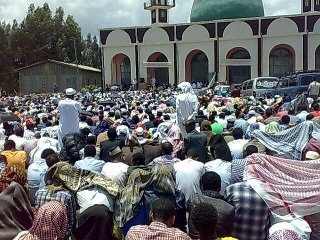OnIslam & News Agencies
Thursday, 02 August 2012 00:00
 |
|
Mass arrests of Muslim leaders by
Ethiopian authorities have cast a pale on the protest movement
in the country
|
NAIROBI – An Ethiopian crackdown on Muslim demonstrations
against government interference in religious affairs is casting its pale on the
protest movement, amid signs that the dissent is dying down.
“So far, we have not seen anything illegal. None," Hailu
Shawel, chairman of the oppositionAll Ethiopian Unity Party, told Voice of
America.
"They [the government] just want to control everything that
moves, control everything that sticks, control everything that tries to move in
a direction which they do not like.”
Protests have rocked Ethiopia over the past weeks over
government interference in the religious affairs of Ethiopian Muslims.
To quell the protests, the Ethiopian government launched a
major crackdown, arresting scores of Muslim protest leaders.
Last month, security forces raided the Awalia Mosque in Addis
Ababa, arresting more than 70 Muslims on claims of planning protests.
Among those arrested were the chairman of the committee
chosen to be representative of the Muslim community Abubakar Ahmed, spokesman
Ahmedin Jebel, and other committee members.
Sources told OnIslam.net that those arrested are being kept
in custody in Maikelawi and are at risk of torture or other forms of
ill-treatment.
In response, thousands of Muslims gathered at the Anwar
Mosque to protest the arrests and interference in their religious affairs. More
Muslims, however, were arrested.
Ethiopian police officials have accused those arrested of
masterminding the Muslim protests.
Federal Police commissioner Workneh Gebeyehu has said even
before the arrests, the “members of the committee were urging others to follow
in their footsteps, therefore those arrested at Anwar were organized by the
committee.”
He claimed that the police investigation “shows the whole
movement is associated with extremism.”
But since the arrests, Muslim protests against government
interference in their religious affairs have quieted.
Last week, Muslim demonstrators stood silently outside the
Anwar mosque with their arms crossed, to mime the act of being arrested, or with
their hands over their mouths.
Muslims make up about 34 percent of Ethiopia’s population.
Extremism
The Ethiopian government denies accusations of suppressing
the Muslim community, arguing that it is only fighting extremism in the country.
“The issue is not about religion,” police commissioner
Gebeyehu said.
“Our people, particularly those peace-loving Muslims, should
understand this."
But Ethiopian politicians warn that the government crackdown
on Muslims would fuel extremism and lure foreign extremists into the country.
“The internationalists will walk in and create a situation
that we see today in many countries,” Hailu said.
“We don’t want that. We have enough problems.”
Ethiopian Muslims accuse the government of spearheading a
campaign in collaboration with the umbrella Supreme Council of Islamic Affairs (Majlis)
to indoctrinate their community with the ideology of a sect called "Ahbash".
The government of Ethiopian Premier Meles Zenawi has put the
Ahbash in charge of the religious affairs of Ethiopia's Muslims.
Muslims say the government move is in violation of the
constitution, which prevents the government interference in religious affairs.
Muslims also accuse the Ahbash of launching an
"indoctrination program" in predominantly Muslim areas, forcing people to attend
"religious training" camps or risk police interrogation and possible arrest.
Founded by Ethiopian-Lebanese scholar Sheikh Abdullah
al-Harari, Ahbash is seen by the West as a "friendly alternative" to Wahabi
ideology, which the West sees as extreme and militant.
Muslims say Ahbash imams are being brought over from Lebanon
to fill the Majlis and teach Ethiopians that “Wahabis” are non-Muslims
Source :
http://www.onislam.net/english/news/africa/458349-ethiopia-arrests-overshadow-muslim-protests.html |

